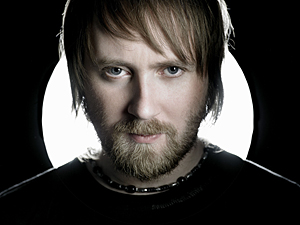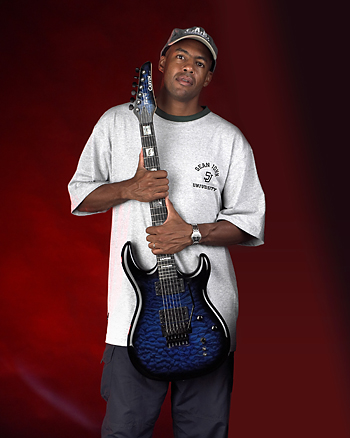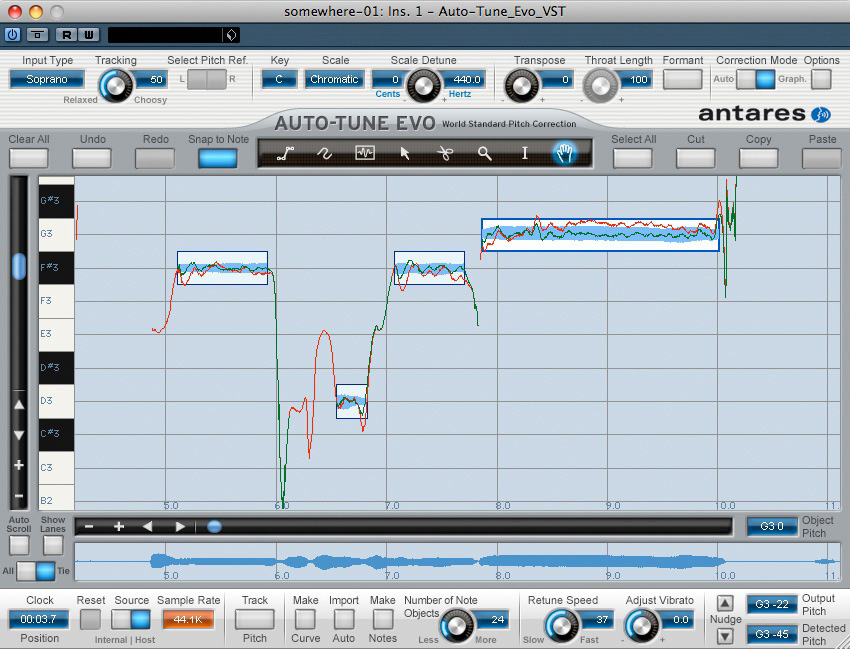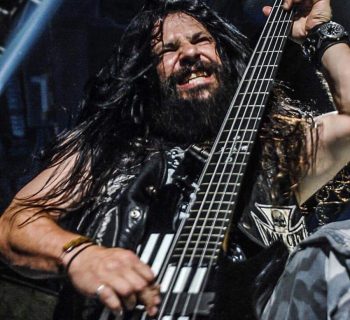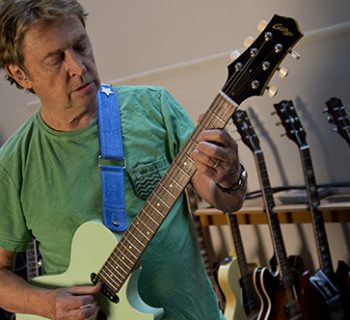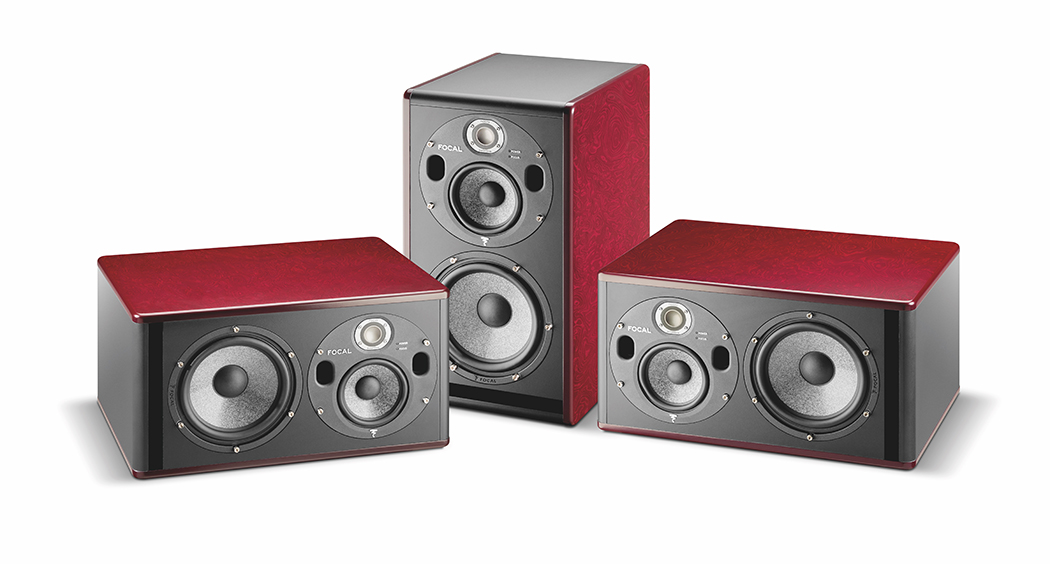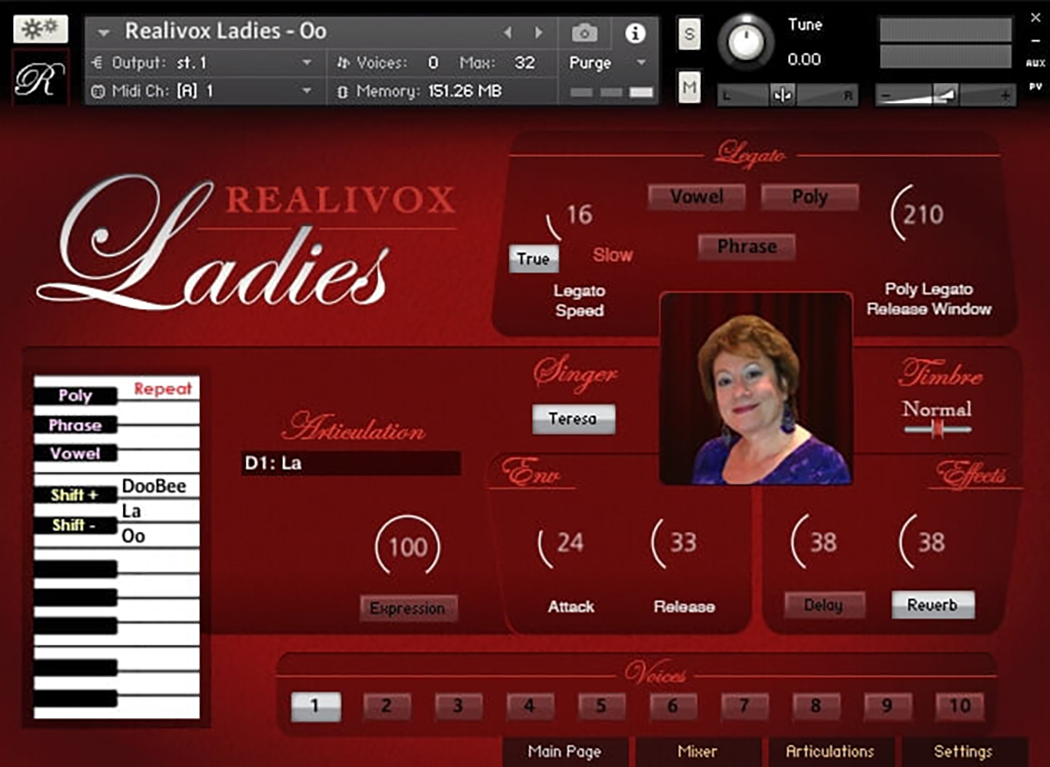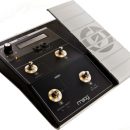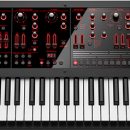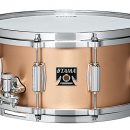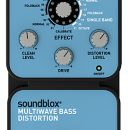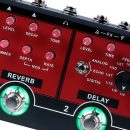To a Generation of Listeners Who May Not Even Realize He’s Got A Famous Dad
If you’re at all like us, your first reaction was probably the same as ours — Who even knew that Phil Collins had a son, let alone one old enough to be releasing his third studio album (his first US release)? After listening to U-Catastrophe, the new album from London-born, Vancouver-based Simon Collins, we can affirm that this was definitely a welcome surprise! And don’t worry for a moment that he’s some hack musician trying to catch a free ride on Dad’s success — Simon Collins is chock full of the kind of talent that serious musicians will appreciate.
Fusing modern rock, electronica, and pop with years of growing up listening to Genesis, Collins released an album filled with strong songs that span a variety of styles sure to appeal to everyone from classic Genesis fans to a young modern rock audience.
Simon possesses the drumming chops and style of his father (how many of us got to learn drumming from the Phil Collins?) and the keyboard style of Tony Banks fused with some obvious NIN and techno influences. He’s also a whiz at sound design and music production, though on U-Catastrophe he handed the primary production duties to renowned producer/engineer Kevin Churko (former engineer to Robert “Mutt” Lange, and with credits including Ozzy Ozbourne, Ringo Starr, Shania Twain, The Corrs, and more).
Not only does Simon Collins bear a striking resemblance to his dad, but also he sounds like Phil when singing (and perhaps to our ears is an even stronger rock vocalist). Any fan of Genesis or Peter Gabriel will certainly hear those influences in Simon’s music — there’s even a great instrumental drum “duet” between father and son, and Genesis guitarist Steve Hackett even makes a cameo appearance. This is all great fun coming from a guy who is just as likely to cite Kurt Cobain as a musical influence as he is to recount all those years sitting off the side of the stage watching Phil and Chester Thompson turn it on and on again.
If you haven’t listened to U-Catastrophe yet, you can read our album review here.
I wanted to get into my progressive rock influences, which are… which stem from basically since I was a fetus.
MPc: Let’s talk about U-Catastrophe!
SC: This is my third album, U.S. debut. And I’ve got to say this is my best work to date, without a doubt. Working with Kevin Churko was really… it’s a gift to work with someone so talented. And also [he’s] just a great guy, you know, just really easy to get along with and to collaborate with. So it was really cool how it all came together.
MPc: How did it all come together?
SC: I was looking for a deal in the States. I spent a great deal of time in Europe, and my records were fairly successful over there. I met Michael Caplan [who signed Collins to Razor & Tie in the USA] and at the time I was doing a cover of “Keep it Dark” by Genesis for their 40th anniversary.
I was working with Dave Kerzner, who owns Sonic Reality Software, and we did that together. I played it to Michael Caplan. He was working at Columbia at the time. He loved it. Flipped out and was, like, “Oh my god, we’ve got to do something here. We’ve got to get something going. Have you heard of Kevin Churko?” And I hadn’t actually heard of Kevin Churko before I got to work with him.
And he was, like, “Yeah, he just released or he just finished producing Ozzy’s new record, Black Rain,” which I think is his best record, one of his best records. Primarily because it was one of the only records he recorded sober, and he’s on the ball. And going to his catalog of artists and bands he worked with, working with Mutt Lange — a huge, huge teacher there.
And so I was really into getting… diving to the deep end and kind of getting a little… digging deep into my rock-and-roll roots. Because on the first record, I was experimenting with my electronica, my love for electronica, which hasn’t dissipated. It hasn’t gone away. I mean, you can hear it…
MPc: It’s all over the new album.
SC: Here it is more elemental and ornamental on this record than anything. But it is, yeah. It’s kind of infused into the rock elements. But I wanted to drum. I wanted to drum my ass off on this record because I just felt like on my last record I didn’t play as much as I wanted to. And I wanted to get out some of those influences that really weren’t represented on my other records, and that was really my punk rock influences, my alternative rock influences that kind of stem from the whole Seattle thing, Alice in Chains and, dare I say it, Nirvana, you know what I mean?
And also I wanted to get into my progressive rock influences, which are… which stem from basically since I was a fetus. [laughs] So I really wanted to get to London, to that world, and Kevin was certainly the guy to help me get there, working on a lot of rock-and-roll records.
So I flew down to Vegas — I live in Vancouver. And he’s got a little home studio there. We did a trial session, and we hit it off instantly. And we worked on the first songs, as they came out of that session — “Powerless” and “Disappearing,” which, for me, are two of the highlights of the album, for sure.
So at that point Caplan flipped and said, “Okay, let’s do it.” And he changed jobs and ended up landing a job with Razor & Tie, and that was his first signing, and it was all very exciting.
So we got a chance to finish the record, and we did it – I guess we started in September and finished in February or March. But I was coming back to Vancouver to take a breather and also write and come up with sound design. Because I produced or co-produced my other records, and I’ve obviously co-produced this record, too, I didn’t want that to kind of fall by the wayside just because I’m working with a big known producer. I still wanted to get my sound design in there.
I still did all the production ideas that I felt the album needed. And so it was actually really cool the way we ended up working. We had two studios. His studio, obviously, was the main room where we tracked the drums and guitars and bass. And then I had my own separate room where I had an Axiom 25 [MIDI controller] set up and Logic on the Apple laptop, had all my gadgets and stuff. And we just went back and forth working on sound design.
We co-wrote a lot of the songs on the record. Some of them were ideas that I hadn’t really revisited them since I’d written them. Some of them two years old; some of them five years old. “Unconditional,” for instance, is the first single, which is doing pretty well right now. That was actually written while I was mixing Time for Truth, which is the second album.
Some of these songs date back quite far. And then some of them were just written right there in the room together, started from scratch, and that was also really exciting as well.
I also wanted to do something with my dad. I thought that it was time. I feel like I’ve got enough albums under my belt, and I felt like it could be done credibly as a bit of a wink and a nod kind of thing.
MPc: At this point your talent certain speaks for itself.
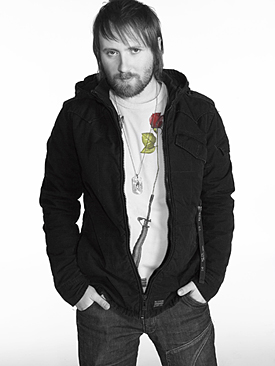 SC: Yeah. So we talked about doing something kind of poppy, and we were both kind of cheesed out by the vocal duet thing. And I was like, “Well, fuck man, why don’t we do something that binds us, our common bond?” Our bond is really drums, and that’s the first instrument for the both of us, and certainly how we connect musically more than anything else.
SC: Yeah. So we talked about doing something kind of poppy, and we were both kind of cheesed out by the vocal duet thing. And I was like, “Well, fuck man, why don’t we do something that binds us, our common bond?” Our bond is really drums, and that’s the first instrument for the both of us, and certainly how we connect musically more than anything else.
So I devised an idea to do a drum duet, as opposed to a drum battle because then everyone says “who won?” [laughs]
"I prefer to use just a few items that I know how to use really well
and then get the most out of them."
MPc: I have to ask you regarding that song, “The Big Bang.” When you played the idea for your dad, did he say, “Hey, this reminds me of ‘Land of Confusion’?” [laughs] Have you noticed a similarity in the feel of the song?
SC: No, I didn’t actually. No one has ever said that before!
MPc: I immediately thought of the song “Land of Confusion.” [laughs]
[Simon proceeds to hum a little bit of the Genesis classic, or maybe some of “The Big Bang.”]SC: Yeah, I’ve got to say it flew over my head, but certainly I can see where you’re coming from on that. Yeah, wow, first time I ever heard that!
MPc: Wow. That’s funny. Obviously it’s not the same music, but there was a similar vibe…
SC: My inspiration was the drum duet that him and Chester Thompson used to do when he was on tour.
MPc: No doubt. Those were classic Genesis moments.
SC: That was my favorite part of the show. It was a highlight. I used to sit behind the drums and kind of dodge broken drum sticks and just watch and learn; absorb.
So I wanted to do something similar, and he expressed enthusiasm about a demo that I did with a buddy of mine ages ago, which was of similar fashion, free-form synth jams and primal drums.
So we did the same kind of thing, and it was awesome. We didn’t get to do it at the same time. I mean, I did my drum tracks first and I basically left parts for him to do. I didn’t write the parts for him obviously. That would be a bit much.
I certainly had an idea of how I wanted it to go, and it was a lot of call and answer and call and response and stuff. So that was a really cool and incredible way for us to do something together without the pressure of having to do something commercial. Not that it couldn’t actually have some sort of commercial value in licensing and stuff like that but that’s not what we were thinking. We were thinking “Let’s go do something great. Let’s go do something really powerful and something with passion.” So that was really cool.
MPc: Your Dad isn’t the only Genesis member to make an appearance on U-Catastrophe.
SC: I also wanted to work with Steve Hackett for the longest time. So “Fast Forward the Future” was the perfect song, I thought, in terms of an electro-funk kind of epic; whatever you want to call it. But it’s been one of the more progressive arrangements on the album.
So I just – there was a bunch of space, and I was, like, “Wow, we need Hackett on this,” and he got back to us immediately. He was, like, “Yeah, once I get off this tour we’ll all go in the studio and send you a WAV file.” And it was fantastic. It was beautiful.
So I got a chance to work with some – not in the same room, unfortunately, but I got a chance to work with some of my idols that I’ve looked up to all these years. And it was just really – it really lent the album a little bit more depth and just kind of paying homage to my heritage as well.
It’s a very dynamic record in the sense that you thought – you know, songs like “Disappearing” and “All I’ve Left to Lose,” which are really on the heavier side. And then you hear a song like “Us (Love Transcends),” which is probably the most beautiful love song I’ve ever written and a very special song for me because it was written for my partner, Debora Lucyk, and also for my stepdaughter, too.
So it was really a very emotional record, too; the most personal album I’ve ever written. And it really was – I was really revealing a side to myself that I had never revealed before and singing about things that I wasn’t comfortable talking about, let alone singing about, just a couple of years ago. And I really (kind of) bring the listener into a more private and a deeper side to who I am, which I think is important.
Also, I’m kind of battling my demons, and a lot of these songs were written after I got out of rehab and dealt with my constant struggle and battle with addiction. But “U-Catastrophe” was really – the title stems from J.R.R. Tolkien’s – you know, he coined that term, “Eau Catastrophe.”
MPc: That’s when all of a sudden the clouds part and the sun comes out and everything is well in the kingdom.
SC: Right. You’ve read the bio. [Editor’s Note: Tolkien and prog rock go together like peanut butter and jelly. It is possible we knew that term prior to the interview.] When some turn of events end up in the protagonist’s well being, that kind of thing…
And in this case I saw my own personal eau catastrophe was really going through rehab or treatment and being at rock bottom, and kind of being at wit’s end, and on the verge of losing my relationship, and my career and my life. And making that change at the 11th hour to turn it all around, to find a way back to happiness and health and love.
So that was my own personal eau catastrophe — that was the main theme, but it makes sense and could be interpreted on so many different levels. For example, I know everyone is sick to death of hearing about it, but global warming. We’re at that point now where we’re at the 11th hour, as Leonardo DiCaprio says, and I believe it. We need a eau catastrophe now. We need to make that U-turn before it’s too late, before we smash into the fucking wall.
MPc: Yeah.
SC: And it’s also on a political level. And so that theme runs rampant throughout the entire album. So it was a concept album.
MPc: Let’s talk about some of your keyboards, because obviously synths played a huge role in this record. There’s obviously a big Genesis influence. You clearly grew up listening to your dad’s music, and Tony Banks… the style is certainly present in what you’re playing.
SC: You can hear it there. I can’t take all the credit though because Dave Kerzner came in and did a lot of keyboard work for us, and sound design as well, and he’s a huge Genesis fan, also. So some of that certainly, without a doubt, came off as well.
But nonetheless, absolutely. I mean, I just – I love the simplicity in some of the keyboard stuff that Tony Banks does, and I love some of the intricacies, too. And finding a way to bring it to balance when you’re making [a record] – it really is pop-rock/rock-pop. So finding a balance there; that’s difficult.
MPc: Tell us about some of the specific gear you were using. Our audience cares much more about what you’re playing and how you’re playing it than what you drank last night at dinner.
SC: [laughs] Well, I’m using Logic – I use Logic Audio, first of all, for my recording. And I’m using a Mac Book Pro. When I did the “Keep it Dark” thing with Dave, I ended up getting a shitload of free stuff. Apple Loops, Amplitube and Atmosphere, Sonik Synth. I have a lot of sounds that I design myself through Nord and Waldorf.
MPc: Are you using their hardware synths?
SC: Yeah. I’ve got their racks, the Nord racks. And they’re great for sound design. So I use those. And, geez, I’m blanking here. I mean, there’s a plethora.
I use a lot of OhmBoyz stuff as well. OhmBoyz just are awesome. They – it’s actually called Ohm Force, sorry. That’s the name of the company. But they have all these plug-ins that are amazing, like phasers and delay modules. And I use those for effects. And a big part of creating sound is just [combining effects] — I think Logic also has great stock effects, a multi-effects selection catalog, with bit crushers and distortion and all that kind of stuff.
You know, this is pretty much – you know, it’s simple, but I prefer to use just a few items that I know how to use really well and then get the most out of them. I use the EXS sampler, which is, once again, it’s the stock default sampler from Logic, but it’s great. It works great.
The Atmosphere was something I really wanted to get my hands on. That is such an amazing synthesizer if you’re into creating sound, like mental atmospheres and soundscapes.
MPc: I’ve heard so many great things about Atmosphere, even from some other artists that I’ve spoken with. I think Gary Numan told me how much he loved it.
SC: Yeah, this thing is huge. It’s very cool. There was just so much. We didn’t really use too much of my stuff. He’s got his own system, Kevin Churko. He uses ProTools and he’s got fucking shitloads of plug-ins, as you can imagine. But we didn’t spend – we spent a lot of time on the songwriting and the lyrics and the quality of the song, and then we just touched it up and put the icing on the cake, and tried not to get too deep into the sound design thing.
Because that’s one thing that held me up on my other two records, just going too… way too over the deep end with sound design, two weeks on one sound and that kind of thing.
I’ve got to say this is the most focused I’ve been — doing a record, and probably the most work, which is a big part of why it turned out to be a great record. And I also… I found my voice in this album. I found my range. And working with Kevin certainly helps — the way in which we did the vocal tracks.
And also, what I was singing about was very raw and very fresh for me. I think, yeah, just finding the right range for my voice was really important. So that conviction really comes through.
MPc: It’s interesting that you split your efforts between drumming and singing.
SC: you know, to be honest with you, my first love was drums, and I always wanted to be a drummer in a great band like Genesis. That was kind of, like, my big dream when I was growing up, when I was young. And then I started playing in school bands and stuff and getting serious and started playing in bands out of high school.
And then I realized, well, fuck man, I’ve got all these songs I’ve written. And I’ve played in punk bands and death metal bands and anything I can get my hands on. But at the end of the day, the songs I’m writing just – they just weren't fitting the kind of style that I was playing – the bands that I was working in. So that sort of prompted me to go solo.
You never really finish art. It’s abandoned.
MPc: Tell me about your songwriting process. Do you start with some cool synth sounds, or do you start with your lyrics, or do you grab a guitar?
SC: It’s really interesting. It really depends. Every song has its own story. I don’t have one way of doing it. I mean, I guess I could say that in most cases, how I write is I’ll sit down at the piano or, not as much, the guitar, but usually the piano… I’ll sit down and I’ll just find some chords that really work well together. And then I’ll find a vocal melody that really works nice over that, and I have no idea what I’m singing. I’m not singing anything, just kind of going [hums]. Whatever kind of flies out of my mouth, a little bit of free-association writing or something.
But then eventually lyrics come into the picture and usually the mood is set immediately. I know I might not be singing exactly what I want to say, but I know what I want to say, what the mood is, what am I singing about.
The lyrics usually come last. In some cases they’ve come the day before I’ve done the vocal tracks or the day of, you know. And it’s not because I’m a slacker. It’s because I want to… I’ll work on it until I can’t work on it anymore. I’m a perfectionist. And you know the whole thing about [how] you never really finish art. It’s abandoned, and that whole kind of thing. It’s a bit pretentious, but part of it is really true. But it’s interesting. Sometimes the lyrics… they just fly out of your mouth, and you know what you want to say.
For me, you know, it’s interesting on guitar. Obviously my more rock influences come out writing on that instrument and the more (kind of) pop sensitive love ballad-y kind of stuff comes out on piano. And sometimes it’s just a blueprint for – like for the piano, for instance. I’ll do a quarter piano take, and eventually I’ll MIDI that up to some other sounds or have another instrument play that part, and the piano doesn’t even end up being part of the song. It’s just a songwriting tool.
I wouldn’t consider myself to be much of a pianist or a guitar player, but they’re songwriting tools for me. And sometimes the piano ends up sticking because it’s a great line, and sometimes it doesn’t.
But I just do whatever is best for the song; that’s how I write. And I’m very flexible. I do like to co-write with people. I also know when to say, “Hey, this one’s mine.” [laughs] You know, “I’m gonna finish this one off. This means too much to me.”
But at the same time I’m not gonna shy away from asking for help or getting someone’s input on a song and collaborating. If I think it needs work or if they offer up an idea that is obviously going to make the song better, then you step outside of your ego and say, “Hey, okay, that works great.”
I didn’t only co-write with Churko. I co-wrote with Kelly Nordstrom, my guitar player, and Dave Kerzner, who – I think you know who Dave Kerzner is now.
MPc: Yeah [laughs].
SC: And I also wrote with my partner, Debbie Lucyk, Debora Lucyk, or a.k.a. Digital Debbie. She’s a videographer, and actually we did all the videos together for this album. So far we’ve done “Unconditional” and “Powerless.” But we co-wrote “Eco” together, which was awesome. So, yeah, I’m very much into… I’m very open-minded when it comes to the songwriting process.
MPc: Do you remember what microphone you tracked your lead vocals on?
SC: Ah, shit. It was… Jesus!
[Editor’s Note: and thus began the gear guessing game!]
MPc: You know, you worked so hard to find the right vocal sound.
SC: I don’t want to say it was a Neumann. But it was German, a German microphone.
MPc: Telefunken?
SC: Telefunken, yes.
[And for my guessing-game prize, I won this fantastic interview!]Bands break up. That’s what they do.
MPc: Let’s talk about your drums. What are you playing? What did you record on the album? Was it your kit or just gear in Kevin’s studio?
SC: The drums were a collection of pieces from all over the place. You know, Kevin’s got his own kit there, but I have a pretty big setup. I’ve got two roto toms, two rack toms, and then two floor toms, and double kick, black double mallet.
I’m playing Gretsch drums and Sabian cymbals. But in this case we were playing whatever he could get his hands on. I didn’t want to have to ship my own kit out there because for the most part his kit in its simple form was enough for most of the drumming tracks that we were doing on the album. But for something like “The Big Bang,” I required all my toms and setup.
So we went out and we rented a few toms and a bit of a mismatch color-wise, but who cares. [laugh] We cleared out the living room in his house and just mic’d the whole house and got a fantastic room sound; I mean, just fantastic natural reverberance.
MPc: Your drum sound, the sound of your kit, is very reminiscent of your father’s drum sound.
SC: Yeah. I think a lot of that has to do with, first of all, we play on similar style kits. And I’ve just… I adopted his setup because I think it fucking rocks. [laughs] And I’ve just… I’ve never played any other way.
It’s always been – even when I was playing with punk bands, they’d be, like, “All you need is fucking one tom, one rack and one floor. What’s with the big fucking setup?” I’m like, “Dude, you don’t understand. Shit, I’ve gotta’ play this way. Trust me. Wait and hear.” [laughs] And eventually they kind of go, “Yeah, I’m glad you brought that up.”
There’s a certain style that, listening to Genesis more so than – well, you know, my dad’s solo stuff, too – that I just love. I love those double flams [hums drumming sound]. Like, that’s just so fucking powerful, you know?
And it’s not like I’m out to copy my dad or anything. I’ve just – I really did adopt a lot of his things because it’s his style, and directly— “Hey, will you teach me how to play that killer fill you just did tonight?” You know, because why the hell not?
MPc: If my dad drummed like yours, I’d embrace that for sure.
SC: And it was… so I’ve had firsthand access… obviously I’m very lucky, very blessed to have had the opportunity to be so close to working and just being around such amazing musicians, one of whom was my dad.
And it’s not like I was picking his brains all the time, you know. If anything it was more just kind of… I was the silent on the side of the stage, sitting in the wings on the side of the stage just kind of taking it all in, you know. And I learned a lot.
I used to – actually, when I was practicing, I used to play four hours a day minimum and always I would play to Second’s Out from beginning to end, “Supper’s Ready” and the whole bit, the medley. So yeah, I loved that. He was one of my teachers.
So long story short, yeah, there’s certainly a lot of similarities within our drum style, technique, the way we play, the way it sounds. His toms are way, way bigger than mine are. His floor toms are fucking ridiculously huge. But there’s also the genetics that kick in with the voice.
And [hearing the similarity] is a compliment. I don’t see any reason why that would be a negative thing, though some people have said that might make things harder for me. And it’s like, well, yeah, I heard about one radio station that didn’t want to play “Powerless” because they didn’t want to play Phil Collins anymore. And so, well, that’s ridiculous, okay?
MPc: It’s just like, “Come on now, I sing better than that guy!” [laughs]
SC: Right, you know. But people hear it and they hear Phil Collins. And they go, “Well, this person sounds like Phil Collins.” And Phil Collins is apparently, to some people, in some form, that’s not hip anymore. So sometimes we get painted with the same brush, but I can’t change it, and I wouldn’t want to change my heritage and who I am.
Some people are like, “Change your name,” and I’m, like, “why the fuck would I do that?”
MPc: Ha!
SC: Or “why are you doing the solo artist thing? That’s putting more pressure on you.” I’m like, “Well, because that’s what I do.” I’ve tried the band thing. Trust me; I’ve tried it. Bands break up. That’s what they do.
MPc: Story of my life.
SC: Except for the blessed few, Rolling Stones, there’s many, many examples. But for the most part, when you’re trying to get something together there’s so many variables. The chemistry has to be there between all of you, and everyone’s got to have their shit together on the same… everyone’s got to be on the same page. And musically, socially, the list goes on.
MPc: Oh, trust me. I know firsthand of that particular struggle. It’s so much more than just whether or not the guy can play an instrument.
SC: Absolutely. And it might work for the time being, but eventually those things you didn’t think about or didn’t really take into account or kind of brushed off in the beginning are going to come back to bite you in the ass. And then what do you do when you’re stuck with a record deal and you don’t like the guys you’re playing with?
That’s not necessarily the situation I’ve been in, [though] I’ve been in some pretty tumultuous situations. But anyway, we don’t need to go there. Ccertainly it’s spurred me on to do what I always kind of felt eventually I would do, and that was to just follow my own music.
And actually, I did go under a different name at first.
MPc: Oh yeah, what was that?
SC: Oh, this is kind of embarrassing.
MPc: Oh, come on. [It’s just for a big online magazine interview]
SC: It’s called Skin.
MPc: Skin?
SC: Skin. Yeah, because I was doing a lot of drumming; a lot of primal stuff, kind of like “Big Bang” stuff. So it was more experimental. And once I started getting more into the pop writing I just went back to my name.
MPc: The album has quite a diverse range of styles on it. And I suppose that, in its own right, is what might make you call it progressive rock. But overall, the collection of songs range from more mainstream rock and pop to progressive. It’s an interesting mix that not everyone will appreciate.
SC: No, I realize that. [laugh]
MPc: And depending on what song the record company pushes can really position you in a very different light as an artist.
SC: Oh, I know, man, tell me about it.
MPc: So where do you want to be?
SC: Well, it’s difficult. I’m just happy to have the record out there to give people a chance to listen to the music. I used to be really obsessed. You know, in my first albums I really obsessed about what singles [came out] in what order, and that’s because also my records weren’t as dynamic.
We chose the first single, “Unconditional,” and that was just a song that we all knew was just going to be more palatable for more people. And right now in the AOR format kind of demographic, it’s going to be interesting when we release something like this because, first of all, your credibility goes out the window. But this is still a part of me.
So, I think we can have success in multiple formats. I think that’s something that maybe 10, 15, 20 years ago might not have flown, I don’t know. But I think it is possible to have success in different formats if it’s done properly and with the genuosity that the record was made with.
I love all these styles of music, and I want to represent all my influences on this record. You know, I would have liked to come off a little harder, but then a song like “Unconditional” would have been really hard to release after that. So it’s kind of like… it’s just a chicken and the egg kind of situation. It’s a catch-22. I’m just happy to have the music out there.
And to be honest, “Unconditional” is a really special song to me. It’s the poppiest song on the album to the point where Kevin and I discussed taking it off [the record] because we were, like, “Wow, this is probably the only song that’s kind of… it kind of makes you feel a bit happy.” [laughs] And you know as a songwriter it’s the happy songs that are fucking really hard to write.
Kevin was like, “Maybe you might want to think about selling this to a country artist or whatever.” And the thought crossed my mind — I’m talking, like, seconds, and I was like, No. That song is way too important to me. It’s about my close friends and family that have stood by me through thick and thin when I was going through my hardest, rock bottom tumultuous times, and it’s a tribute to their unconditional support and love. And I want to be the one singing that song. It’s got to be on my record.
And everyone loved it. I was very surprised. Kevin and I were both surprised. And then especially when [everyone just] came out and said, “Hey, this is gonna be the first single.” Like, oh my god, wow.
The song that we were going to take off the album is the champion, the flag track to the album. And we’re near Top 10 in the States right now and Top 20 in Canada, and it’s great. I mean, I couldn’t ask for more. People are just getting the record out there, and at the end of the day that’s what all that matters.
So I’m learning, as I progress here and evolve as a recording artist, to just appreciate things that you have and not whine and moan about the things that you don’t have. And also, to trust the people that you’re working with. I’m very lucky to be working with a great bunch of people at Razor & Tie. A lot of them have worked with my dad before, which is really cool.
My manager specifically. Because they’re with Sony Red. They're distributed through Sony Red. And Danny Bush used to… he ran the promotion team when my manager was in radio. And they actually broke “In the Air Tonight.” So there’s this loyalty and this wanting, this willingness, to just do so much good and to really do everything they can to get this record off the ground. So it’s… I’m very lucky to be working with great people.
And on that note, certainly the trust factor, as I was talking about, just learning to trust. These decisions might not be the ones I would have made off the top of my head, but I now understand why we’re looking at a very successful first single to the album. And we’re just getting started here. It’s great.
MPc: I was curious. In fact, we were thinking a lot of Genesis fans who discover U-Catastrophe are immediately going to wonder if “The Good Son” is about you and your dad.
SC: Well, when I played it to my dad I said, “I wrote this song about my mom, and out of respect for the family I want you to hear it first. And if you think it’s too hard or if you just have anything to say about it, I’d like to know before I go out there and release it.”
Because my mom and I had a falling out, and we basically haven’t spoken since – we have now, but it was pretty much like two years from when I got out of rehab, for about two years we didn’t speak, and for a lot of fucking good reasons, and reasons I discovered while I was in group therapy, and all that kind of stuff.
And so I wrote this song. And I realized a little later, well, actually when my dad wrote back, he said “Beautiful song.” He really liked the words and the mood. But one thing he did say was “Make sure that people know that it’s not about me.”
And I was, like, “Well, how could that be?” And I listened to the lyrics back again and I’m, like, “Well, no shit. Yeah, of course, people would totally think that.”
MPc: Yeah. Hello! [laughs]
SC: Well I know now, but when I was writing it I thought it was obvious, lyrically, that it was about my mom saying I couldn’t live my life from other’s hands, and my father figure’s lost in lies. For me it was obvious, but no, it could be misinterpreted big time. And so it’s certainly one thing to clear up. It’s not about my dad. My dad and I have a pretty cool relationship, and I’ve never been compelled to write a song about us.
MPc: Great! Had we not spoken about this, the truth might not have come out.
SC: Yeah — it’s great! Thanks for bringing it up, because it gives me a chance to put it out there.

